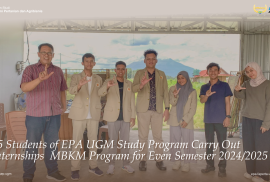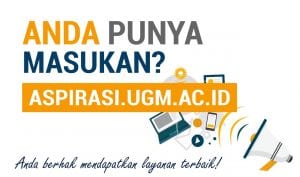Yogyakarta, February 20, 2025 – 85 6th Semester Agricultural Economics and Agribusiness (EPA) Study Program students at Universitas Gadjah Mada began implementing the MBKM Internship program on February 10, 2025. This program lasts for one semester and is spread across 23 partner institutions and companies, including:
-
- Dinas Pertanian dan Pangan Kabupaten Magelang (3 students)
- PT Hibrida Jaya Unggul (2 students)
- PT Erista Garden Asri (3 students)
- Dinas Pertanian dan Ketahanan Pangan DIY (6 students)
- Badan Pengawas Keuangan dan Pembangunan (BPKP) Pusat (6 students)
- PT Natural Nusantara (2 students)
- Dinas Pertanian, Pangan, dan Perikanan Kabupaten Sleman (8 students)
- BAPPEDA Kabupaten Sleman (1 students)
- Pusat Penelitian Teh dan Kina (PPTK) Gambung (3 students)
- Bank BRI Kanwil DIY (14 students)
- PT Pagilaran Pusat (2 students)
- PT Indigen Karya Unggul (4 students)
- Dinas Pertanian dan Pangan Kabupaten Gunungkidul (2 students)
- Bank BPD DIY (5 students)
- Badan Pusat Statistik (BPS) Kabupaten Magelang (3 students)
- Kementerian Koordinator Bidang Pangan (5 students)
- Perum Perhutani Pusat (2 students)
- Perum Perhutani KPH Kedu Utara (Magelang) (3 students)
- BULOG DIY (3 students)
- BULOG Kabupaten Magelang (2 students)
- BULOG Kabupaten Banyumas (1 students)
- PT Perkebunan Nusantara IV Regional 2-Medan (4 students)
- PT Perkebunan Nusantara IV Regional 5-Pontianak (1 students)
The Merdeka Belajar-Kampus Merdeka (MBKM) program aims to provide students with opportunities to learn directly in related institutions and companies. Using the concept of link and match between academics and the world of work, this program helps students gain practical experience, hone professional skills, and understand the dynamics of the agribusiness sector and agricultural economy firsthand.
The MBKM program allows students to convert this internship experience into 10-20 credits through the EPA Study Program curriculum. Thus, students can still fulfill learning outcomes without falling behind the academic curriculum.
Through this internship program, students are expected to develop professional competencies, industry networks, and a deeper understanding of the world of work in agribusiness and agricultural economics. With this experience, they are better prepared to compete in the world of work and make a real contribution to developing Indonesia’s agricultural and food sectors.



